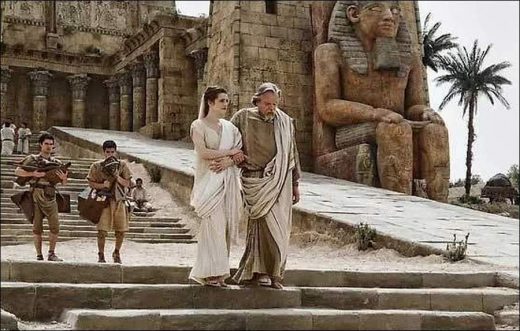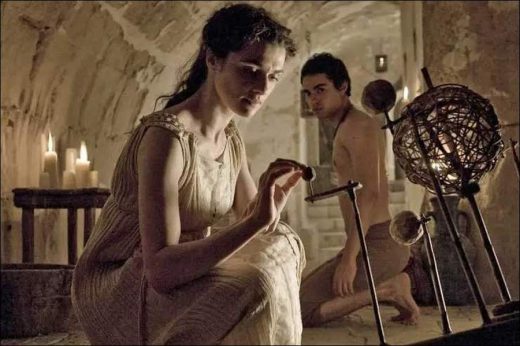Hypatia is the first female mathematician whose works have survived. He lived between 370–415 AD; She was born in Alexandria and died in Alexandria. In order to understand the reasons for what happened to Hypatia, it would be useful to first know the Alexandria of those years;
Alexandria is a city in Egypt founded in 332 BC by Alexander the Great, king of Macedonia and student of Aristotle. After Alexander’s death (323 BC), it was ruled by Ptolemy, Alexander’s most trusted general, and his family. A very large university and library were established. It became one of the most important cultural centers of the age. Although the Alexandrians barely managed to maintain their independence from the Roman Empire for a time, they gave up in 80 BC.
In 326 AD, Emperor Constantine I wanted to move the center of the Roman Empire to the east in order to escape the intrigues of Rome and founded Constantinople, that is, Istanbul. He accepted Christianity immediately afterwards. The conflict between pagans and Christians continued into the fifth century. As we will see later, Alexandria, where Jews and Greek pagans were active, also had its fair share of this fight.
Hypatia’s father, Theon, was a mathematics instructor at the University of Alexandria. He later became rector of the university. Hypatia benefited from the rich scientific environment in Alexandria. At a young age, he learned to ask questions, investigate and doubt. Theon wanted to raise his daughter as a perfect person. He took over his daughter’s education and became both her teacher and playmate.
He did everything he could to ensure complete knowledge of handicrafts, poetry, philosophy, religion, astronomy, astrology and mathematics. He was a very good teacher. He loved the subjects he taught and could convey his love to others. He taught his daughter the great religions known in that age and in that part of the world. He did not allow himself to be stuck in dogmatic thoughts and religions. “All dogmatic religions are full of errors and should not be accepted as the final truth by any self-respecting person” and “You should always exercise your right to think. Because thinking wrong is better than not thinking at all,” he said to his daughter.
He gave due importance to his daughter’s not only mental but also physical development. Certain hours of the day were devoted to sports. Hypatia learned to swim, row, ride a horse, and mountaineering… Years later, Hypatia added what she learned from her father to what she learned on her own and wrote:
When Hypatia grew up a little, she set out to travel the world. He went to Rome and Athens. The Athenian philosopher took lessons from the neo-platonic Plutarch. During this journey he became famous as a mathematician. When he returned to Alexandria, he was asked to teach mathematics and philosophy at the university. He gladly accepted. Wasn’t he bred for these days?
Hypatia was a very popular and good teacher. Historian Socrates (not the famous Athenian philosopher Socrates) writes that Hypatia’s classroom and home were filled with students, scholars and thinkers of the age. Students from Europe, Asia and Africa flocked to Alexandria just to become Hypatia’s students. He usually gave lessons from Diophantus’ famous work Arithmetic.
Hypatia wrote many books on mathematics. Unfortunately, only fragments of these books have survived to the present day. Most of them were damaged in the fire of Alexandria and the destruction of the temple of Serapis by angry people. It is known that he wrote at least one book on Euclid with his father.
Fragments of a work of Diophantus that contributed to his work on astronomy were found in the Vatican library in the 15th century. It is known that Hypatia also wrote a book called “On the Cones of Apollonius”. After Hypatia, this issue remained untouched until the second half of the 17th century.
Until Descartes, Fermat, Newton, Leibniz arrived. Apart from this, we have the notes of Ptolemy in astronomy and Diophantus’s arithmetic books. Hypatia is famous for its various inventions used in sky observations, water purification, and navigation. Hypatia was so famous that letters addressed to the “Alexandrian philosopher” or the “Alexandrian muse” were addressed directly to her.
Hypatia considered herself a member of a school of thought called the Neoplatonists. The scientific method of thought of this school contradicted the dogmatic and bigoted ideas of Christians. In AD 412, a man named Cyril was appointed head of the patriarchate of Alexandria. Kiril was a devout Christian who fasted and prayed in the deserts. Still, he did not withdraw from worldly affairs. An army of marauders called Parabolari was under his command.
Parabolaris originally served as today’s Red Crescent or Red Cross. Then they lost their purpose and started stealing and stealing. Cyril began his attack on the pagans from the weakest ones. He destroyed a lot and killed a lot of innocent people. Then it was blamed on the Jews, who had been protected by special laws and lived in peace since the founding of Alexandria. He destroyed their temples, that is, their synagogues, and expelled them from the city. Although Egyptian inspector Orestes complained to his government about Kiril’s actions, he could not get any results.
Cyril wanted to seize not only religious power but also political power. Therefore, Orestes and his followers had to be destroyed, or at least Orestes had to be weakened. Hypatia was one of the most important and foremost of Orestes’ close friends. He was respectable, knowledgeable, well-spoken, and famous. Hypatia had to be eliminated. Rumors spread in the city that the only obstacle to the friendship of Orestes and Kiril is Hypatia.
The environment has been prepared for the most horrific murder in the history of mathematics. With the help of the agitators, the looters, the unemployed, the ignorant are urged against the non-Christian Hypatia. While in her car in front of the university, Hypatia is attacked by these monsters. First they peel it, then they shred the meat with mussel shells and throw it into the fire.
Of course, an investigation will be opened. Can’t it be opened? But thanks to bribery and a show of power, it is closed before it ends. Cyril informs the public that Hypatia is in Rome and has not been lynched. He may have deceived the Alexandrians, but he could not deceive History.
Visits: 36





